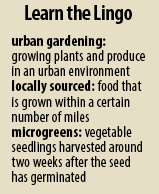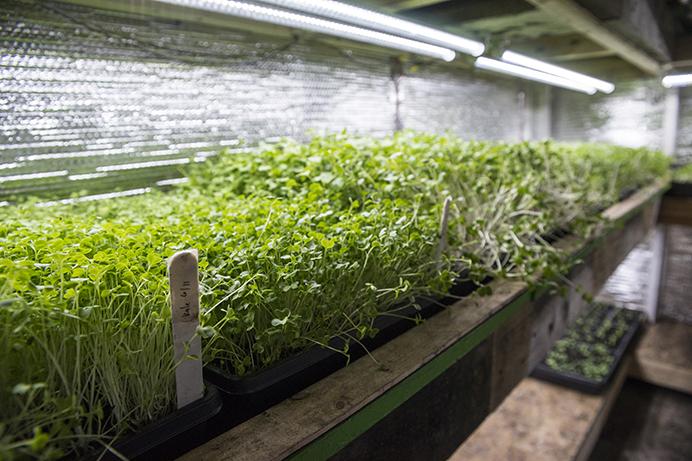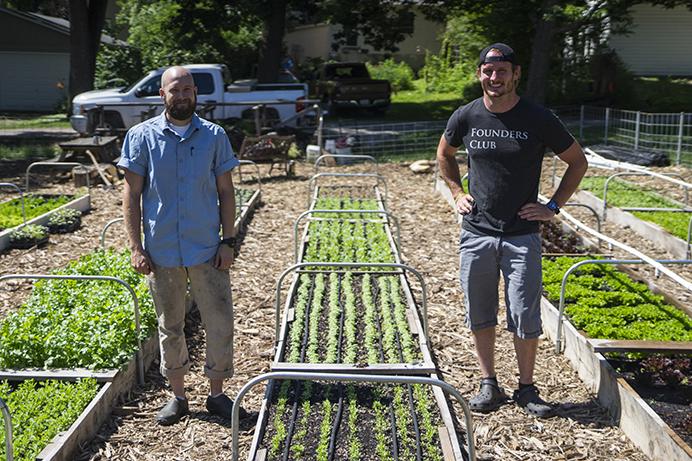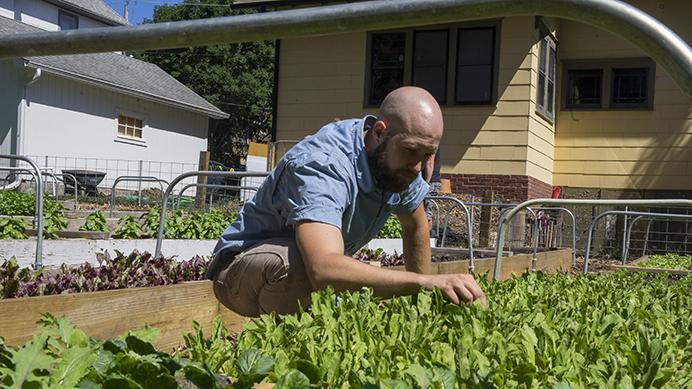‘New Age’ farmers grow local produce year-round
Ted Meyers, co-owner and operator of Urban Greens discusses his production method used for microgreens at 1135 E College St. on Monday, June 19. Urban Greens, a microgreens producer, is part of a growing trend in urban gardening, which utilizes the earlier stages of plant growth for harvest. Meyers along with co-owner Chad Treloar offer their products to many local businesses such as Heirloom, Big Grove, Pullman, Cobble Hill, and Atlas. (Ben Smith/The Daily Iowan)
A pair of roommates transformed their residence into an urban garden and now sell their produce to local restaurants and at the Iowa City Farmers’ Market.
Co-owners of Urban Greens Chad Treloar and Ted Myers spend more than 80 hours a week tending to thousands of “microgreens” growing in their basement and backyard.
“No one else is doing it in this area,” Treloar said. “It’s a pretty good niche for Iowa City.”
Microgreens are small, nutrient-packed produce that can be used as an alternative for lettuce on sandwiches and burgers, blended into smoothies, or tossed into salads. Treloar and Myers plant arugula, sunflowers, sweet corn, cilantro, broccoli, and several other varieties of vegetables and harvest them just a few weeks later, well before they are mature plants.
The two began selling their produce at the Farmers’ Market in May, and every week they meet more and more people interested in learning about urban gardening and purchasing bulk produce for restaurants.
 Their produce can be found in meals at such Iowa City restaurants as Heirloom, Big Grove Brewery, Pullman, Cobble Hill, and Atlas.
Their produce can be found in meals at such Iowa City restaurants as Heirloom, Big Grove Brewery, Pullman, Cobble Hill, and Atlas.

Soon, they will be able to grow throughout the winter, when it is hard to come across fresh, locally sourced produce.
“We’re not just growing lettuce in the ground,” Treloar said. “We’re trying to innovate and become the New Age urban farmers. The old way of doing things isn’t working out. The population is only getting bigger and bigger, and if you can find new ways of growing things and educating people, that’s the most important thing.”
Treloar and Myers hope to expand their business over the next several years to more plots of land and a large-scale greenhouse. In the meantime, they are working side jobs to pay their bills, putting as much time and effort into building their business as they can.
“It’s something we care about,” Myers said. “It’s not a 9-to-5 job; it’s not someone else’s decisions; it’s not someone else’s money. It’s what we want to do, so the hours and the lack of money on the short term is worth it.”

Myers said the operation is more economically and environmentally sustainable than most traditional farming because of the space used — the basement and the backyard — were vacant before. They also compost what they can, build with recycled materials, and minimize electrical input to keep energy costs low.
“I would argue that sustainability is one of the most important issues with this project, mostly by necessity,” Myers said. “It’s important to be efficient economically speaking, and we are pushing toward making a successful business, which is sustainable.”
An urban organic farmer from Cedar Rapids, Chris King, has collaborated with Treloar and Myers for two years.
“What inspires me the most with those guys is that they’re learning by watching YouTube and reading books,” King said. “It’s been a total treasure to have those guys standing side-by-side with me. There’s no competition. The more people we can get growing their own food, the better.”



